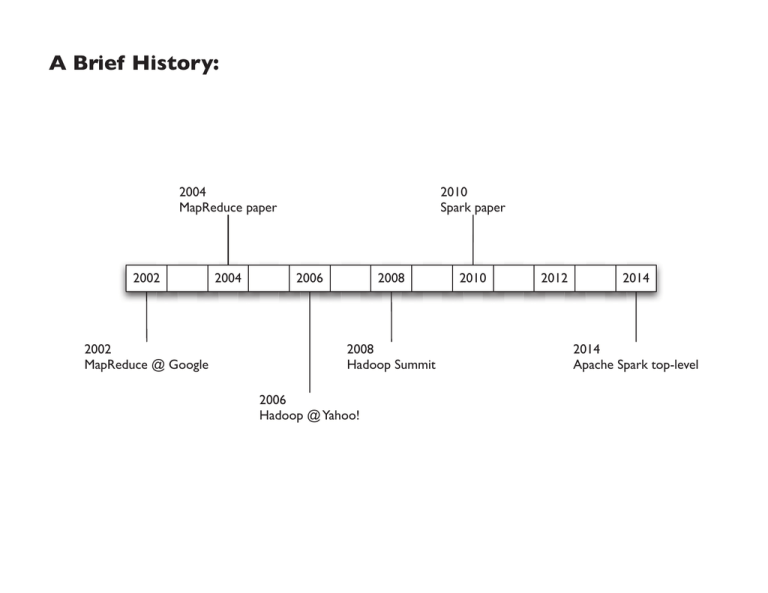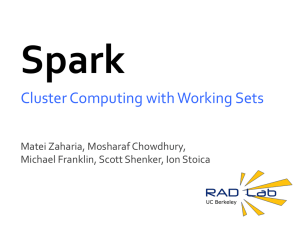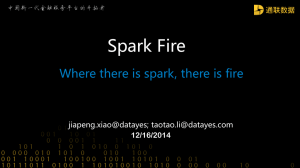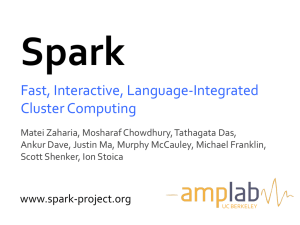A Brief History:
advertisement

A Brief History:
2004
MapReduce paper
2002
2002
MapReduce @ Google
2004
2010
Spark paper
2006
2008
2008
Hadoop Summit
2006
Hadoop @ Yahoo!
2010
2012
2014
2014
Apache Spark top-level
A Brief History: MapReduce
MapReduce use cases showed two major
limitations:
1. difficultly of programming directly in MR
2. performance bottlenecks, or batch not
fitting the use cases
In short, MR doesn’t compose well for large
applications
Therefore, people built specialized systems as
workarounds…
A Brief History: MapReduce
Pregel
Dremel
MapReduce
Giraph
Drill
Impala
GraphLab
Storm
General Batch Processing
Specialized Systems:
iterative, interactive, streaming, graph, etc.
The State of Spark, and Where We're Going Next
Matei Zaharia
Spark Summit (2013)
youtu.be/nU6vO2EJAb4
Tez
S4
A Brief History: Spark
Unlike the various specialized systems, Spark’s
goal was to generalize MapReduce to support
new apps within same engine
Two reasonably small additions are enough to
express the previous models:
• fast data sharing • general DAGs
This allows for an approach which is more
efficient for the engine, and much simpler for the end users
A Brief
ef History: Spark
The State of Spark, and Where We're Going Next
Matei Zaharia
Spark Summit (2013)
youtu.be/nU6vO2EJAb4
used as libs, instead of
specialized systems
A Brief History: Spark
Some key points about Spark:
•
handles batch, interactive, and real-time within a single framework
•
•
•
native integration with Java, Python, Scala
programming at a higher level of abstraction
more general: map/reduce is just one set of supported constructs
A Brief History: Spark
The State of Spark, and Where We're Going Next
Matei Zaharia
Spark Summit (2013)
youtu.be/nU6vO2EJAb4
Spark Essentials: SparkContext
First thing that a Spark program does is create
a SparkContext object, which tells Spark how
to access a cluster
In the shell for either Scala or Python, this is
the sc variable, which is created automatically
Other programs must use a constructor to
instantiate a new SparkContext
Then in turn SparkContext gets used to create
other variables
Spark Essentials: Master
The master parameter for a SparkContext
determines which cluster to use
master
description
local
run Spark locally with one worker thread (no parallelism)
local[K]
run Spark locally with K worker threads (ideally set to # cores)
spark://HOST:PORT
connect to a Spark standalone cluster; PORT depends on config (7077 by default)
mesos://HOST:PORT
connect to a Mesos cluster; PORT depends on config (5050 by default)
Spark Essentials: Master
spark.apache.org/docs/latest/clusteroverview.html
Worker Node
Exectuor
task
Driver Program
cache
task
Cluster Manager
SparkContext
Worker Node
Exectuor
task
cache
task
Spark Essentials: Master
1. connects to a cluster manager which
allocate resources across applications
2. acquires executors on cluster nodes –
worker processes to run computations
and store data
3. sends app code to the executors
4. sends tasks for the executors to run
Worker Node
Exectuor
task
Driver Program
cache
task
Cluster Manager
SparkContext
Worker Node
Exectuor
task
cache
task
Spark Essentials: RDD
Resilient Distributed Datasets (RDD) are the
primary abstraction in Spark – a fault-tolerant
collection of elements that can be operated on in parallel
There are currently two types: •
parallelized collections – take an existing Scala
collection and run functions on it in parallel
•
Hadoop datasets – run functions on each record
of a file in Hadoop distributed file system or any
other storage system supported by Hadoop
A Brief History: Spark
The State of Spark, and Where We're Going Next
Matei Zaharia
Spark Summit (2013)
youtu.be/nU6vO2EJAb4
Spark Essentials: RDD
•
two types of operations on RDDs: transformations and actions
•
transformations are lazy (not computed immediately)
•
the transformed RDD gets recomputed when an action is run on it (default)
•
however, an RDD can be persisted into storage in memory or disk
Spark Essentials: RDD
Scala:
scala> val data = Array(1, 2, 3, 4, 5)
data: Array[Int] = Array(1, 2, 3, 4, 5)
scala> val distData = sc.parallelize(data)
distData: spark.RDD[Int] = spark.ParallelCollection@10d13e3e
Python:
>>> data = [1, 2, 3, 4, 5]
>>> data
[1, 2, 3, 4, 5]
>>> distData = sc.parallelize(data)
>>> distData
ParallelCollectionRDD[0] at parallelize at PythonRDD.scala:229
Spark Essentials: RDD
Spark can create RDDs from any file stored in HDFS
or other storage systems supported by Hadoop, e.g.,
local file system, Amazon S3, Hypertable, HBase, etc.
Spark supports text files, SequenceFiles, and any
other Hadoop InputFormat, and can also take a
directory or a glob (e.g. /data/201404*)
transformations
RDD
RDD
RDD
RDD
action
value
Spark Essentials: RDD
Scala:
scala> val distFile = sc.textFile("README.md")
distFile: spark.RDD[String] = spark.HadoopRDD@1d4cee08
Python:
>>> distFile = sc.textFile("README.md")
14/04/19 23:42:40 INFO storage.MemoryStore: ensureFreeSpace(36827) called
with curMem=0, maxMem=318111744
14/04/19 23:42:40 INFO storage.MemoryStore: Block broadcast_0 stored as
values to memory (estimated size 36.0 KB, free 303.3 MB)
>>> distFile
MappedRDD[2] at textFile at NativeMethodAccessorImpl.java:-2
Spark Essentials: Transformations
Transformations create a new dataset from an existing one
All transformations in Spark are lazy: they do not compute their results right away –
instead they remember the transformations
applied to some base dataset
• optimize the required calculations
• recover from lost data partitions
Spark Deconstructed: Log Mining Example
// load error messages from a log into memory
// then interactively search for various patterns
// https://gist.github.com/ceteri/8ae5b9509a08c08a1132
// base RDD
val lines = sc.textFile("hdfs://...")
// transformed RDDs
val errors = lines.filter(_.startsWith("ERROR"))
val messages = errors.map(_.split("\t")).map(r => r(1))
messages.cache()
// action 1
messages.filter(_.contains("mysql")).count()
// action 2
messages.filter(_.contains("php")).count()
Spark Deconstructed:
Looking at the RDD transformations and
actions from another perspective…
// load error messages from a log into memory
// then interactively search for various patterns
// https://gist.github.com/ceteri/8ae5b9509a08c08a1132
// base RDD
val lines = sc.textFile("hdfs://...")
transformations
// transformed RDDs
val errors = lines.filter(_.startsWith("ERROR"))
val messages = errors.map(_.split("\t")).map(r => r(1))
messages.cache()
// action 1
messages.filter(_.contains("mysql")).count()
// action 2
messages.filter(_.contains("php")).count()
RDD
RDD
RDD
RDD
action
value
Spark Deconstructed:
RDD
// base RDD
val lines = sc.textFile("hdfs://...")
Spark Deconstructed:
transformations
RDD
RDD
RDD
RDD
// transformed RDDs
val errors = lines.filter(_.startsWith("ERROR"))
val messages = errors.map(_.split("\t")).map(r => r(1))
messages.cache()
Spark Deconstructed:
transformations
RDD
RDD
RDD
RDD
action
// action 1
messages.filter(_.contains("mysql")).count()
value
Spark Essentials: Transformations
transformation
map(func)
filter(func)
description
return a new distributed dataset formed by passing each element of the source through a function func
return a new dataset formed by selecting those
elements of the source on which func returns true
flatMap(func)
similar to map, but each input item can be mapped to 0 or more output items (so func should return a Seq rather than a single item)
sample(withReplacement,
fraction, seed)
sample a fraction fraction of the data, with or without
replacement, using a given random number generator
seed
union(otherDataset)
return a new dataset that contains the union of the
elements in the source dataset and the argument
distinct([numTasks]))
return a new dataset that contains the distinct elements
of the source dataset
Spark Essentials: Transformations
transformation
description
groupByKey([numTasks])
when called on a dataset of (K, V) pairs, returns a
dataset of (K, Seq[V]) pairs
reduceByKey(func,
[numTasks])
when called on a dataset of (K, V) pairs, returns a dataset of (K, V) pairs where the values for each key are aggregated using the given reduce function
sortByKey([ascending],
[numTasks])
when called on a dataset of (K, V) pairs where K
implements Ordered, returns a dataset of (K, V) pairs sorted by keys in ascending or descending order,
as specified in the boolean ascending argument
join(otherDataset,
[numTasks])
when called on datasets of type (K, V) and (K, W),
returns a dataset of (K, (V, W)) pairs with all pairs of elements for each key
cogroup(otherDataset,
[numTasks])
when called on datasets of type (K, V) and (K, W),
returns a dataset of (K, Seq[V], Seq[W]) tuples –
also called groupWith
cartesian(otherDataset)
when called on datasets of types T and U, returns a
dataset of (T, U) pairs (all pairs of elements)
Spark Essentials: Actions
action
description
reduce(func)
aggregate the elements of the dataset using a function
func (which takes two arguments and returns one), and should also be commutative and associative so that it can be computed correctly in parallel
collect()
return all the elements of the dataset as an array at the driver program – usually useful after a filter or
other operation that returns a sufficiently small subset
of the data
count()
return the number of elements in the dataset
first()
return the first element of the dataset – similar to
take(1)
take(n)
return an array with the first n elements of the dataset
– currently not executed in parallel, instead the driver
program computes all the elements
takeSample(withReplacement,
fraction, seed)
return an array with a random sample of num elements
of the dataset, with or without replacement, using the
given random number generator seed
Spark Essentials: Actions
action
description
saveAsTextFile(path)
write the elements of the dataset as a text file (or set of text files) in a given directory in the local filesystem,
HDFS or any other Hadoop-supported file system.
Spark will call toString on each element to convert it to a line of text in the file
saveAsSequenceFile(path)
write the elements of the dataset as a Hadoop
SequenceFile in a given path in the local filesystem,
HDFS or any other Hadoop-supported file system. Only available on RDDs of key-value pairs that either
implement Hadoop's Writable interface or are
implicitly convertible to Writable (Spark includes
conversions for basic types like Int, Double, String,
etc).
countByKey()
only available on RDDs of type (K, V). Returns a `Map` of (K, Int) pairs with the count of each key
foreach(func)
run a function func on each element of the dataset –
usually done for side effects such as updating an
accumulator variable or interacting with external
storage systems
Spark Essentials: Actions
Scala:
val f = sc.textFile("README.md")
val words = f.flatMap(l => l.split(" ")).map(word => (word, 1))
words.reduceByKey(_ + _).collect.foreach(println)
Python:
from operator import add
f = sc.textFile("README.md")
words = f.flatMap(lambda x: x.split(' ')).map(lambda x: (x, 1))
words.reduceByKey(add).collect()
Spark Essentials: Persistence
Spark can persist (or cache) a dataset in
memory across operations
Each node stores in memory any slices of it
that it computes and reuses them in other
actions on that dataset – often making future
actions more than 10x faster
The cache is fault-tolerant: if any partition of an RDD is lost, it will automatically be
recomputed using the transformations that
originally created it
Spark Essentials: Persistence
transformation
description
MEMORY_ONLY
Store RDD as deserialized Java objects in the JVM. If the RDD does not fit in memory, some partitions will not be cached and will be recomputed on the fly
each time they're needed. This is the default level.
MEMORY_AND_DISK
Store RDD as deserialized Java objects in the JVM. If the RDD does not fit in memory, store the partitions
that don't fit on disk, and read them from there when
they're needed.
MEMORY_ONLY_SER
Store RDD as serialized Java objects (one byte array per partition). This is generally more space-efficient than deserialized objects, especially when using a fast
serializer, but more CPU-intensive to read.
MEMORY_AND_DISK_SER
Similar to MEMORY_ONLY_SER, but spill partitions
that don't fit in memory to disk instead of recomputing
them on the fly each time they're needed.
DISK_ONLY
MEMORY_ONLY_2,
MEMORY_AND_DISK_2, etc
Store the RDD partitions only on disk.
Same as the levels above, but replicate each partition on two cluster nodes.
Spark Essentials: Persistence
Scala:
val f = sc.textFile("README.md")
val w = f.flatMap(l => l.split(" ")).map(word => (word, 1)).cache()
w.reduceByKey(_ + _).collect.foreach(println)
Python:
from operator import add
f = sc.textFile("README.md")
w = f.flatMap(lambda x: x.split(' ')).map(lambda x: (x, 1)).cache()
w.reduceByKey(add).collect()
Spark Essentials: Broadcast Variables
Broadcast variables let programmer keep a
read-only variable cached on each machine
rather than shipping a copy of it with tasks
For example, to give every node a copy of a large input dataset efficiently
Spark also attempts to distribute broadcast
variables using efficient broadcast algorithms
to reduce communication cost
Spark Essentials: Broadcast Variables
Scala:
val broadcastVar = sc.broadcast(Array(1, 2, 3))
broadcastVar.value
Python:
broadcastVar = sc.broadcast(list(range(1, 4)))
broadcastVar.value
Spark Essentials: Accumulators
Accumulators are variables that can only be
“added” to through an associative operation
Used to implement counters and sums,
efficiently in parallel
Spark natively supports accumulators of
numeric value types and standard mutable
collections, and programmers can extend for new types
Only the driver program can read an
accumulator’s value, not the tasks
Spark Essentials: Accumulators
Scala:
val accum = sc.accumulator(0)
sc.parallelize(Array(1, 2, 3, 4)).foreach(x => accum += x)
accum.value
Python:
accum = sc.accumulator(0)
rdd = sc.parallelize([1, 2, 3, 4])
def f(x):
global accum
accum += x
rdd.foreach(f)
accum.value
Spark Essentials: Accumulators
Scala:
val accum = sc.accumulator(0)
sc.parallelize(Array(1, 2, 3, 4)).foreach(x => accum += x)
accum.value
driver-side
Python:
accum = sc.accumulator(0)
rdd = sc.parallelize([1, 2, 3, 4])
def f(x):
global accum
accum += x
rdd.foreach(f)
accum.value
Spark Essentials: (K,V) pairs
Scala:
val pair = (a, b)
"
pair._1 // => a
pair._2 // => b
Python:
pair = (a, b)
"
pair[0] # => a
pair[1] # => b
Java:
Tuple2 pair = new Tuple2(a, b);
"
pair._1 // => a
pair._2 // => b



